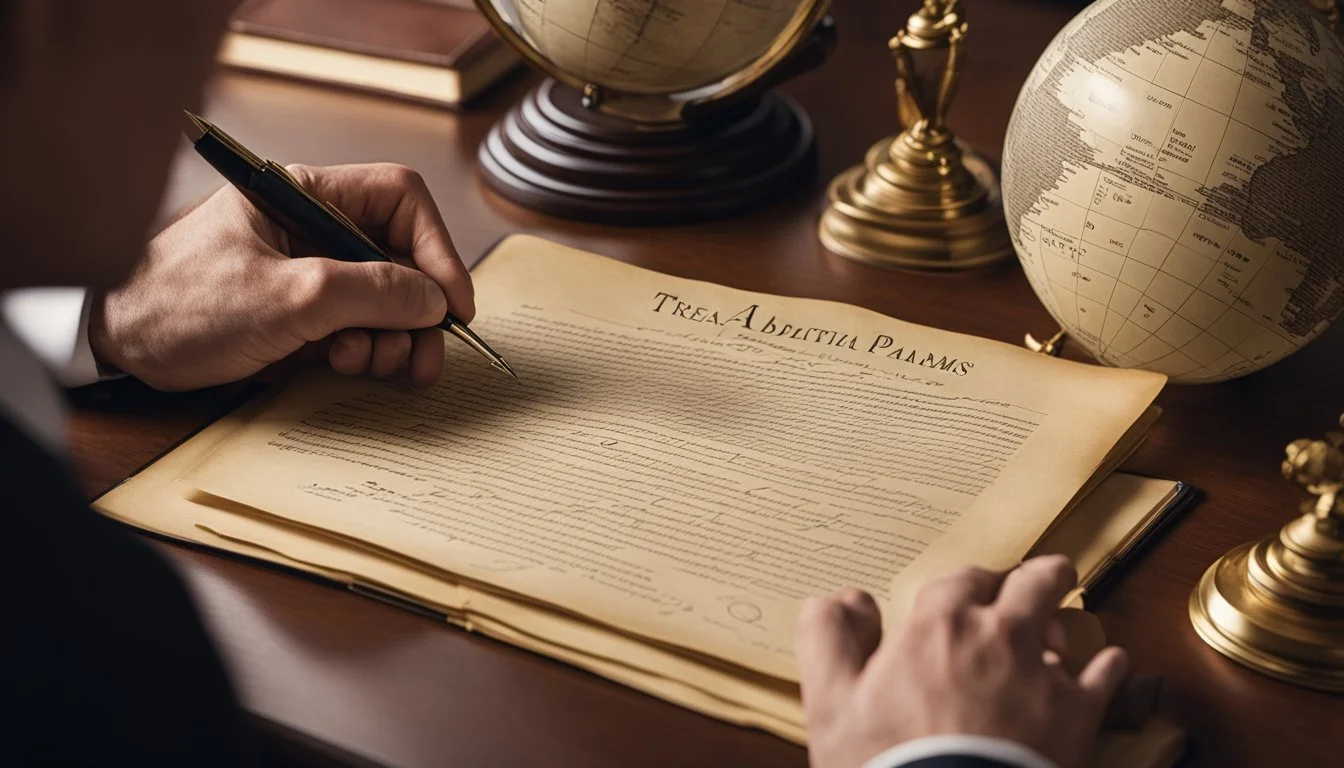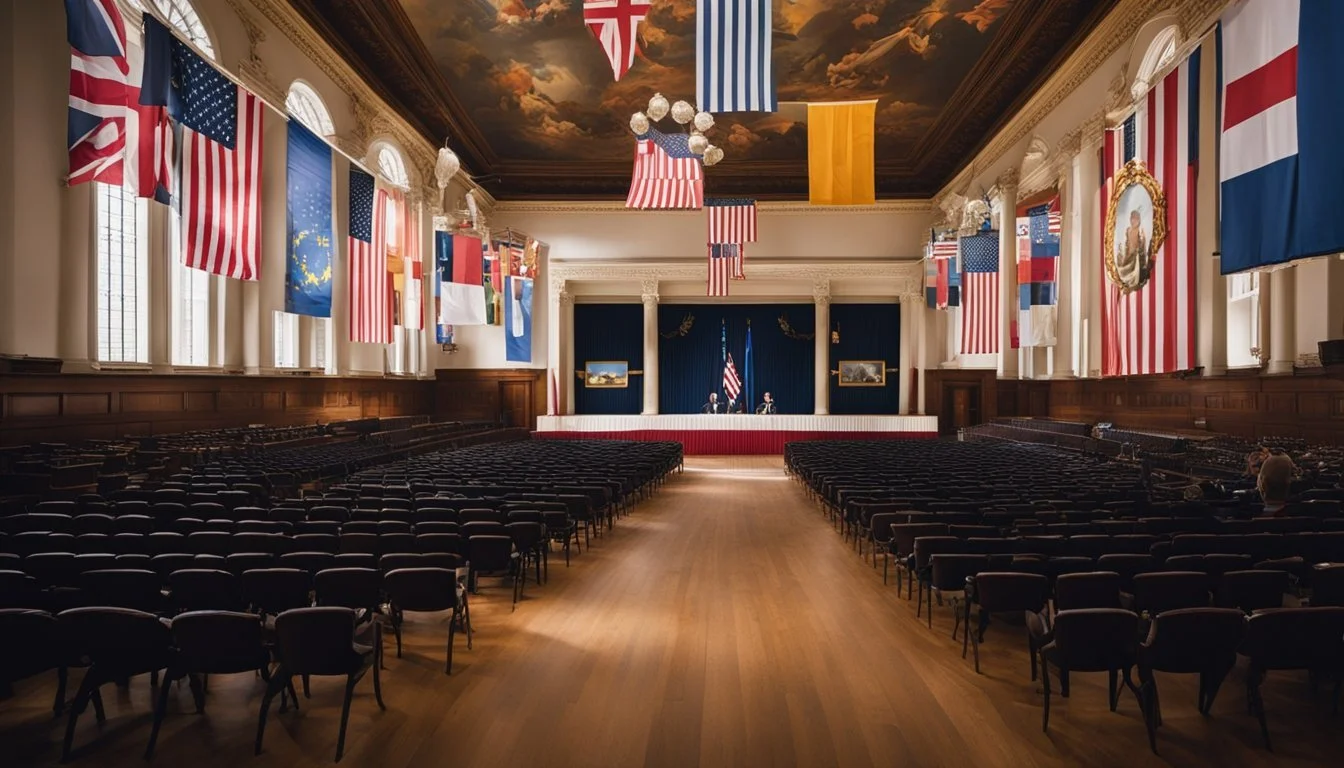3 Must-Watch Films on John Adams' Diplomatic Legacy
Exploring America's Early Foreign Relations
John Adams, a pivotal figure in American history, left an indelible mark on the nation's diplomatic landscape. As one of the Founding Fathers and the second President of the United States, Adams played a crucial role in shaping early American foreign policy and establishing international relations during a critical period of the country's formation.
Three outstanding films offer viewers a compelling glimpse into John Adams' diplomatic legacy, showcasing his skills as a negotiator, statesman, and visionary leader on the global stage. These productions bring to life Adams' tireless efforts to secure recognition and support for the fledgling United States, his navigation of complex European politics, and his dedication to preserving American independence through diplomacy rather than war.
1) 1776 (1972)
"1776" brings John Adams' pivotal role in American independence to life through musical drama. The film portrays the heated debates and political maneuvering leading up to the signing of the Declaration of Independence.
William Daniels delivers a compelling performance as John Adams, capturing his passionate advocacy for breaking ties with Britain. The movie showcases Adams' diplomatic skills as he navigates complex alliances and opposition within the Continental Congress.
While focusing on the events in Philadelphia, "1776" offers glimpses into Adams' broader diplomatic efforts. It highlights his persuasive arguments and unwavering commitment to the cause of independence.
The film's musical numbers add levity to weighty historical moments, making the story accessible to a wide audience. Through song and dialogue, it conveys the personal and political challenges Adams faced during this critical period.
"1776" serves as an entertaining introduction to John Adams' early diplomatic work, setting the stage for his later international missions.
2) John Adams
"John Adams" (2008) is a must-watch HBO miniseries that chronicles the life and diplomatic career of America's second president. The series stars Paul Giamatti as Adams and Laura Linney as Abigail Adams.
The show vividly portrays Adams' diplomatic missions to Europe during the Revolutionary War. It depicts his efforts to secure crucial alliances and financial support for the fledgling United States.
Adams' time in France with Benjamin Franklin is particularly well-portrayed. The series highlights their sometimes tense relationship and differing approaches to diplomacy at the French court.
The miniseries also covers Adams' role as the first U.S. ambassador to Great Britain. It shows his challenging task of establishing diplomatic relations with America's former colonial ruler.
"John Adams" excels in its attention to historical detail and nuanced character portrayals. It offers viewers a compelling look at the complexities of early American diplomacy.
More information on "John Adams" miniseries
3) Founding Brothers
Founding Brothers: The Revolutionary Generation (2024) is a documentary that explores the complex relationships and pivotal contributions of America's Founding Fathers. Based on Joseph Ellis' Pulitzer Prize-winning book, this film offers a unique perspective on the early United States.
The documentary highlights the interactions between key figures such as John Adams, Thomas Jefferson, and George Washington. It examines how their personal connections and conflicts shaped the nation's founding principles.
Founding Brothers delves into critical moments in American history, including the Burr-Hamilton duel and the debate over the location of the nation's capital. These events are presented within the context of the Founding Fathers' larger struggle to establish a stable democracy.
The film uses expert interviews, historical reenactments, and primary source documents to bring this crucial period to life. It provides viewers with a nuanced understanding of the challenges faced by the Revolutionary Generation.
More information on Founding Brothers: The Revolutionary Generation
John Adams' Early Diplomatic Efforts
John Adams played a crucial role in America's early foreign relations. His legal expertise and principled nature shaped key negotiations during the Revolutionary period and its aftermath.
Early Life and Entry into Diplomacy
Adams began his diplomatic career in 1778 when Congress appointed him commissioner to France. He joined Benjamin Franklin in Paris, where tensions arose between the two due to their differing styles. Adams' blunt approach clashed with Franklin's charm and tact.
In 1780, Congress sent Adams to the Netherlands. There, he secured vital loans to support the war effort and negotiated a treaty of amity and commerce. This success bolstered America's international standing and provided much-needed financial support.
Adams' diplomatic skills led to his appointment as minister to Britain in 1785. He faced the challenging task of improving relations with America's former colonial ruler.
Treaty of Paris 1783
Adams served as one of the chief negotiators for the Treaty of Paris, which formally ended the American Revolutionary War. He worked alongside Benjamin Franklin and John Jay to secure favorable terms for the new nation.
The treaty negotiations were complex, involving territorial boundaries, fishing rights, and war debts. Adams pushed for recognition of American independence and advantageous trade agreements.
His legal background proved invaluable in crafting the treaty's language. The final agreement, signed on September 3, 1783, recognized American sovereignty and established borders extending to the Mississippi River.
Impact of Adams' Diplomacy on U.S.-European Relations
John Adams played a crucial role in shaping early American foreign policy. His diplomatic efforts focused on securing alliances and maintaining neutrality during turbulent times in Europe.
French-American Alliance
Adams worked to strengthen ties with France during the American Revolution. He served as a diplomat in Paris, collaborating with Benjamin Franklin to secure French support. Their efforts led to the Treaty of Alliance in 1778, which provided vital military aid to the American cause.
The alliance proved instrumental in winning the war against Britain. However, relations became strained in the 1790s due to the French Revolution and the Quasi-War. Adams faced the challenge of maintaining peace while protecting American interests.
He sent diplomats to negotiate with France, eventually leading to the Convention of 1800. This agreement ended the Quasi-War and reestablished friendly relations between the two nations.
Relations with Great Britain
Adams sought to improve relations with Britain after the Revolutionary War. He served as the first U.S. minister to the Court of St. James's from 1785 to 1788. During this time, he worked to resolve ongoing disputes and negotiate trade agreements.
His efforts laid the groundwork for future negotiations, including Jay's Treaty in 1794. This agreement addressed several issues, such as British withdrawal from American territory and compensation for seized American ships.
Adams continued to navigate complex relations with Britain during his presidency. He aimed to maintain neutrality in European conflicts while protecting American maritime rights. His cautious approach helped prevent a full-scale war with Britain during a period of high tensions.
Long-Term Effects of Adams' Diplomatic Achievements
John Adams' diplomatic efforts laid the groundwork for American foreign policy and influenced future generations of leaders. His work shaped international relations and established important precedents.
Foundations for Future Diplomacy
Adams' diplomatic achievements set crucial precedents for American foreign policy. The Treaty of Paris, which he helped negotiate, established the United States as a sovereign nation on the world stage. This treaty became a model for future peace agreements.
Adams' successful negotiations with the Barbary States demonstrated America's ability to protect its interests abroad. This set the stage for future naval operations and trade agreements.
His emphasis on neutrality during European conflicts influenced George Washington's Farewell Address. This principle guided American foreign policy for decades to come.
Influence on Successors
Adams' diplomatic legacy directly impacted future presidents and diplomats. His son, John Quincy Adams, followed in his footsteps as a skilled negotiator. John Quincy's role in the Treaty of Ghent drew upon lessons learned from his father's experiences.
Thomas Jefferson and James Madison adopted elements of Adams' diplomatic approach during their presidencies. They continued to prioritize American sovereignty and neutral rights in international affairs.
Adams' emphasis on negotiation over war influenced later leaders. This approach shaped America's diplomatic stance throughout the 19th century and beyond.


